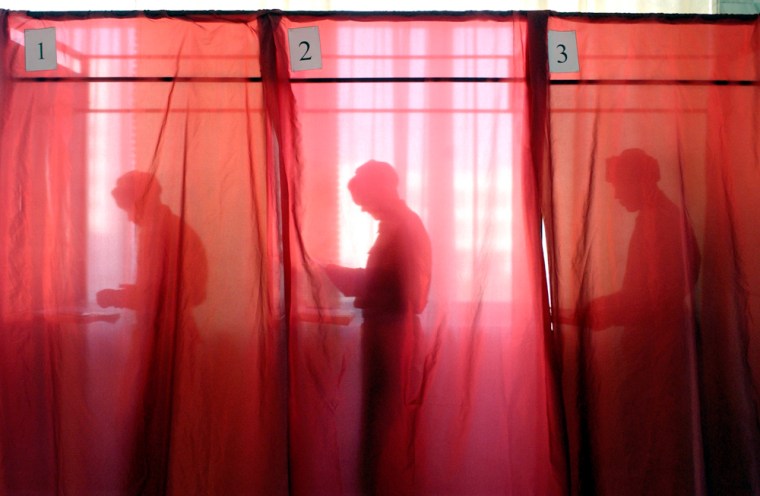President Vladimir Putin on Monday promised Russians more of the stability and order that helped him win his landslide re-election, and pledged to open up the political stage to divergent voices after a campaign criticized as unfair and one-sided.
European election observers criticized Russia’s presidential vote, saying Monday that slanted coverage in the state-run media made for a one-sided campaign and that monitors recorded significant flaws in the vote count.
The campaign and balloting “overall did not adequately reflect principles necessary for a positive democratic election process,” said Julian Peel Yates, head of a joint mission from the Organization for Security and Cooperation in Europe and the Parliamentary Assembly of the Council of Europe.
Russia’s Central Election Commission officially declared Putin the winner early Monday, saying he won a second, four-year term with 71.2 percent of Sunday’s vote.
“I think I have worked hard all those years, and I worked honestly. People must have felt it,” Putin said, appearing before reporters at his Red Square election headquarters tieless, wearing a black sweater under a black blazer. “I promise you that for the next four years, I will work in the same mode.”
The anti-Yeltsin
The former KGB agent is credited by many Russians with bringing stability to this nation after the social and political upheavals brought on by the collapse of the Soviet Union. He has been helped by high world prices for oil, Russia’s main export commodity and the engine driving its economy. Putin’s image as a disciplined, sober, hard-working official also appealed to Russians after his predecessor Boris Yeltsin’s health troubles and reported alcohol abuse.
During the campaign, opposition candidates complained that the state-controlled media’s lavish coverage of Putin gave them little opportunity to get their message to voters. They also charged that regional government officials, apparently eager to curry favor with the Kremlin, hampered their campaign appearances.
Rudolf Binding, head of the Parliamentary Assembly of the Council of Europe delegation, said that monitors reported “significant problems” with counting in about a quarter of the polling places where they were present. The monitors would not say whether they believed the flaws effected the outcome of the election.
The Central Election Commission, however, said the campaign passed without any significant breaches of election law.
Putin’s closest challenger was Communist Nikolai Kharitonov, who had 13.7 percent of the vote with 99.2 percent of the precincts reporting, the commission said. Four other candidates shared the remaining votes. Election officials said 64.3 percent of the registered voters cast ballots, surpassing the 50 percent required for the election to be valid.
U.S. concern about 'authoritarianism'
Putin’s convincing victory — considerably higher than the 52.5 percent of the vote he received in 2000 — further tightens his grip on power.
His first term saw a crackdown on the independent media, a tight leash put on the often unruly governors, the election of an obedient parliament in December, the weakening of opposition parties and the nation’s top posts filled with Putin loyalists and former security officials.
In Washington, Secretary of State Colin Powell said the United States “was concerned about a level of authoritarianism creeping back in the society.”
“We don’t hesitate to point out to President Putin that he should use the popularity that he has to broaden the political dialogue and not use his popularity to throttle political dialogue and openness in the society,” Powell told ABC TV.
That set off an angry rebuke from the Cabinet chief of staff and a calmer retort from Putin, who said the 2000 Florida election fiasco in the United States showed the weaknesses of the world’s oldest democracy.
Some “see the splinter in another’s eye and ignore the log in his own,” Putin said. Russia will consider the criticism and “if we think there is something to think about, will draw the corresponding conclusions,” he said.
Putin vows to help 'all voices'
Putin promised that during his second, four-year term “all the democratic achievements will be guaranteed.”
He said his government would work to develop the multiparty system, ensure further economic growth and strengthen civil society and media freedom.
“We must create conditions to develop parties of every orientation so that the country’s political stage can hear all voices — from small and big parties,” he said.
Putin promised to modernize the country, pledging to ensure economic growth in order to improve the welfare of the nation’s 144 million people, one-fifth of whom live below the poverty line.
Many voters said they backed Putin not because their lives had significantly improved under him, but because they were familiar with the incumbent and hesitant to bring in someone new and the risk of fresh instability.
Despite minimal voter traffic at polling places in cities in Chechnya, election officials claimed turnout in the war-torn region reached nearly 90 percent and that nearly 93 percent voted for Putin, who rose to prominence by launching the latest war there as Russia’s prime minister in 1999.
